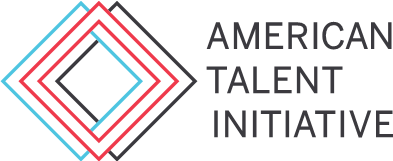American Talent Initiative Reaches 100 Schools Committed to Expanding Opportunity for More High-Achieving, Low-and Moderate-Income Students
We’re happy to share the news that the American Talent Initiative now includes 100 institutions committed to expanding opportunity for more high-achieving, low- and moderate-income students. The full press release about reaching this milestone is below.

In just over a year, ATI has grown from 30 to 100 institutions working to attract, enroll, and graduate high-achieving, low- and moderate-income college students
The American Talent Initiative (ATI), a Bloomberg Philanthropies initiative led by the Aspen Institute’s College Excellence Program and Ithaka S+R, today announced that its membership has reached 100 top colleges and universities working collectively toward the goal of enrolling 50,000 additional talented, low- and moderate-income students at colleges and universities with strong graduation rates by 2025.
Launched in December 2016 with 30 colleges and universities, ATI member institutions must meet the standard of graduating at least 70 percent of their students in six years. Membership in ATI now includes the entire Ivy League, 17 state flagship universities, and private colleges. Some of the highest-enrolling undergraduate institutions in the country are members – including the University of Michigan, Ohio State University, the University of Wisconsin-Madison, and the University of California system – which have the size to scale opportunities for high-achieving, low- and moderate-income students. In addition, 72 private institutions—including newest members Emory University, and Hamilton College—have signed on, which together enroll approximately 340,000 students.
“Family income shouldn’t determine a child’s chances of attending a top college—but too often, it does,” said Michael R. Bloomberg, founder of Bloomberg Philanthropies and three-term Mayor of New York City. “That’s why we created the American Talent Initiative, and colleges have responded enthusiastically. They recognize that it benefits them as much as it does the students, and the more schools that join, the more it will benefit our country.”
As part of the national effort, all member institutions are implementing several strategies designed to attract, enroll and graduate high-achieving, lower-income students, including:
- Identifying talented students through better recruitment of qualified high school graduates and high-achieving transfer students from community colleges and other schools;
- Increasing the number of applications from Pell-eligible students, the number of Pell-eligible students who are enrolled, and the number of first-generation students enrolled;
- Prioritizing need-based aid to make attendance more affordable; and
- Retaining and graduating lower-income students at rates comparable to their higher-income peers.
For example, the University of Michigan aspires to increase Pell-eligible student enrollment to 20 percent by 2020. The University of Wisconsin-Madison is continuing to expand access to low- and moderate-income families with the creation of Bucky’s Tuition Promise, a pledge to cover all tuition and fees for incoming freshmen and transfer students from Wisconsin whose family income is $56,000 or less, roughly the median family income in the state. The University of Dayton plans to increase Pell-eligible student enrollment in their incoming class from 14 percent to 20 percent by 2023.
If successful, the American Talent Initiative would be the equivalent of starting two new universities of 25,000 students each – composed entirely of lower- and middle-income students – which perform in the top 10 percent of universities nationally.
“More students will graduate in less time with less debt. More students will join the work force. More students will become civic leaders,” The Ohio State University President Michael Drake said. “More students will do the things that sustain and advance our society.”
At this time, approximately 290 colleges and universities nationwide consistently graduate 70 percent of their students in six years. The initiative aims to increase the total number of low- and moderate-income students enrolled at these institutions by 50,000 – from about 480,000 to 530,000 students – by 2025. American Talent Initiative member institutions commit substantial resources to increase opportunity for lower-income students, as well as collect institutional data which will be annually published to assess their aggregate progress toward meeting the national goal.
ATI is a companion effort of the Bloomberg Philanthropies’ CollegePoint initiative. Together, ATI and CollegePoint are working to address a persistent problem in college access and completion: each year, for a variety of reasons—including lack of information about their options, confusion about costs, and inadequate financial aid offers—tens of thousands of hard-working, highly talented students fail to enroll in our country’s leading institutions. CollegePoint helps those students navigate the college admissions process and connects them with the institutions where they are most likely to succeed. At the same time, ATI works across institutions to ensure that campuses can enroll and support lower-income students through to graduation.
For a list of members, visit: https://americantalentinitiative.org/who-we-are/
###
About Bloomberg Philanthropies:
Bloomberg Philanthropies works in over 120 countries around the world to ensure better, longer lives for the greatest number of people. The organization focuses on five key areas for creating lasting change: Arts, Education, Environment, Government Innovation, and Public Health. Bloomberg Philanthropies encompasses all of Michael R. Bloomberg’s charitable activities, including his foundation and his personal giving. In 2017, Bloomberg Philanthropies distributed $702 million. For more information, please visit www.bloomberg.org or follow us on Facebook, Instagram, Snapchat, and Twitter.
About The Aspen Institute’s College Excellence Program:
The Aspen Institute’s College Excellence Program (www.aspeninstitute.org/college-excellence) aims to advance higher education practices, policies, and leadership that significantly improve student outcomes. The Program is part of The Aspen Institute www.aspeninstitute.org, which has a mission of fostering leadership based on enduring values and providing a nonpartisan venue for dealing with critical issues.
About Ithaka S+R:
Ithaka S+R (www.sr.ithaka.org) is a not-for-profit service that provides research and strategic guidance to help the academic and cultural communities serve the public good and navigate economic, technological, and demographic change. Ithaka S+R is part of ITHAKA (www.ithaka.org).
Media Contact: Alex Bloom | abloom@skdknick.com | 646-930-1940